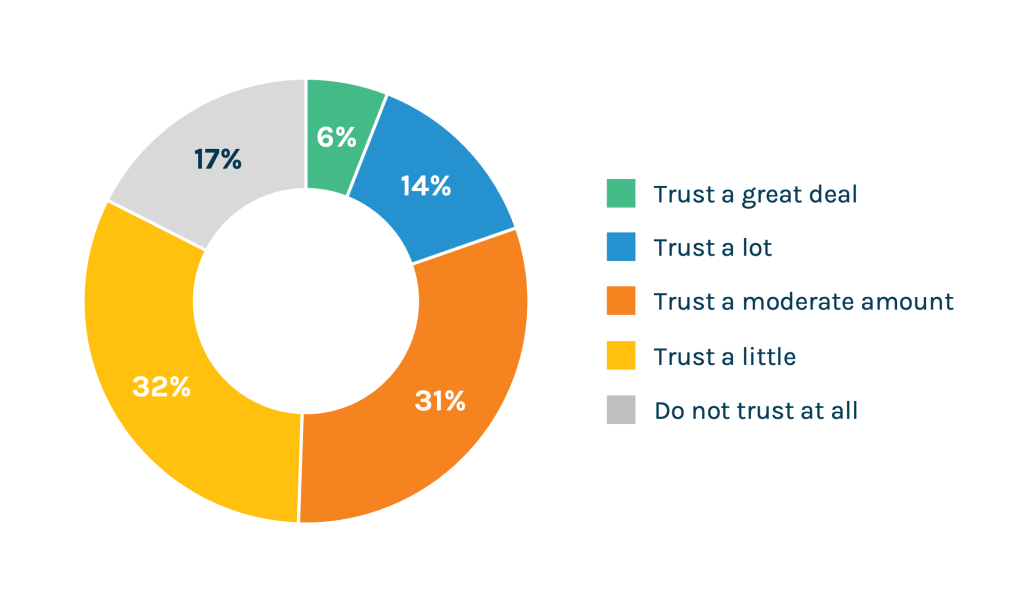The Big Story: These Employers Took On Healthcare Costs, and the Fight Got Nasty
“The Indiana campaign is getting attention well beyond the state. In places including Texas, Florida and Maine, employer groups are pushing for legislation blunting hospital costs, saying they are fed up with increasing rates and fees, as well as the failure of private efforts to contain them.”
A trust fall
By David Jarrard
3-minute read
This Fall’s headline: Trust in healthcare is declining, and the cost to providers is rising.
As trust diminishes, political vulnerability grows, leaving space for other players with less-friendly agendas to enter, dig in and act. It’s happening right now.

“Whether you agree or disagree with each of the following statements, please select which one you agree with the most.”
Consider this: A year ago, our research team asked adults across the country whether their healthcare system’s highest priority was serving patients or generating profits. Just over half chose profits.
Asked the same question two weeks ago, a startling two-thirds said profits come first.
When asked how much they trust hospital and health system leaders when it comes to making decisions about healthcare, only 20 percent trusted healthcare leaders “a great deal” or “a lot.”

“How much do you trust hospital and health system leaders when it comes to making decisions about healthcare?”
Not a good trend.
Fair or not, the relentless scrutiny by media, advocates, regulators, insurers, academics and lawmakers has significantly weakened the community confidence and brand strength that shielded healthcare providers for generations.
What began as a trickle of one-off episodes – a tough reporter here, a bad bill story there, a letter from an angry lawmaker – is now a waterfall of systemic, narrative-changing conversations.
And talk has turned to action, with real-world, bottom-line, strategically expensive consequences. Over the last week alone:
- Approximately 75,000 nurses and staff at Kaiser Permanente walked off the job for three days in the largest recorded strike by America’s healthcare workers. Another 4,000 nurses at Tenet’s 11 California hospitals also authorized a strike. “Kaiser used to pride itself on being the best place to work and the best place to get care,” said one Kaiser tech. “It doesn’t feel like that anymore. It feels like they’ve lost their way.” “Employers were mad,” said the leader of the Employers Forum of Indiana. “Literally pounding-on-the-table mad: ‘This is ridiculous. We’ve got to do something about this.’”
- The Wall Street Journal reported on a crop of new business coalitions in Indiana, Texas, Florida that are taking hospitals to task over the prohibitive cost of care. The headline: “These Employers Took on Healthcare Costs, and the Fight Got Nasty.”
An undercurrent – backed up by our latest research – is loss of trust. You know the immense value of trust. It fuels and lubricates the engines of your workforce and of your community-serving enterprise. With trust, impossible things are possible, meaningful changes can be made, organizations can flex and accelerate, grace is given.
Without it? Even the basics are hard. The potential for change is constricted and vulnerability to outside forces is great (see stories above). We’re seeing it play out now.
Here’s the question: Is the pain great enough to generate action?
Is the loss of trust and the costly risks associated with it now of the magnitude worthy of a concerted and committed effort to address it?
Maybe not. Maybe you feel your organization is deeply trusted by those who matter to you and that you can continue to deal with these issues as they come. And keep coming they will.
But for most, the need to act is real and urgent. You know the fundamentals:
- Have a story to tell – and not just a “Love us because we’re the good guys who save people” story.
- Translate your story into plain language so someone else can’t translate it to serve their agenda.
- Be THE patient advocate, because everything you do is for the patient, all else is support.
- Don’t play the victim.
- Be relentless in telling your story.
These steps aren’t a magic formula for strengthening trust. But they are necessary elements of the process. We talk about trust so often because its strength – or erosion – is a defining issue for healthcare providers today.
Of course, a little context is in order.
Healthcare is not alone in this moment of fading trust. This macro trend is sweeping through every industry and institution. We live in a distrustful age.
For healthcare, there is still a reservoir of goodwill and appreciation for providers of care, putting “the medical system” near the top of the list of most trusted institutions. Our research during and after the pandemic shows that doctors and nurses are the most trusted groups.
There’s hope there, but it’s faint. To say healthcare is among the “most trusted” in today’s environment is a dish rag endorsement.
After all, untapped trust is not helpful to you. Not now. This is not a moment to assume that trust is there, waiting for your call to serve. It must be earned and fed well in this hungry time.
So therefore…Listen and support your clinicians and employees, building trust with those who are trusted. Persistently connect with the stakeholders who matter most to you and your future. Anticipate the “trust fall” and speak to it with honesty and compassion and clarity.
This is a season. Continue to do the work and it will pay off for the next one.
Trust us.
Contributors: David Shifrin, Emme Nelson Baxter
Image Credit: Shannon Threadgill




